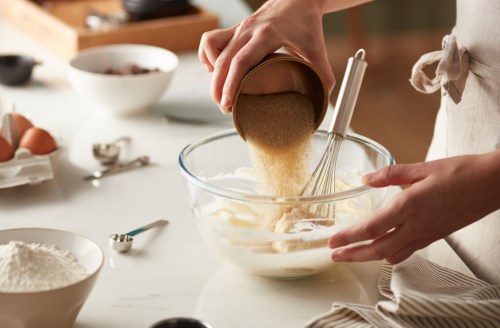Healthy bakers love using coconut sugar as an alternative sweetener, but is it healthy?
Coconut sugar is one of the most popular alternative sweeteners these days, but is coconut sugar healthy? Here's what a registered dietitian has to say.

There’s been a lot of conflicting nutrition advice in the last decade. For a long time we collectively feared fat and counted calories…until we realized that wasn’t accurate or healthy. Every six months, there’s a new study that shows that eggs are either good or bad for your heart health. (We say just eat them.) And don’t get me started on the confusion around red meat. But after all this time, there’s one thing that virtually every health expert agrees upon: Sugar, while delicious, is not a health food, and should be consumed in moderation.
Natural sweeteners, however, are another story. The benefits of honey, for example, are preached regularly. But coconut sugar—aka sugar sourced from coconut trees—has more of a mixed reputation. Many healthy bakers, including Alt-Baking Bootcamp stars Mia Rigden and Jenny Dorsey, swear by it as a better-for-you alternative to cane sugar. But at the end of the day, isn’t it still sugar? How healthy could it possibly be? We asked registered dietitian Carissa Galloway, RD, to help us set the record straight.
Is coconut sugar healthy? Here’s how it compares to cane sugar
The benefits of coconut water are endless. But how about coconut sugar? Coconut sugar, Galloway says, is made from the sap of coconut palm trees (kind of like how maple syrup is sourced from maple tree sap). After the sap is collected, it’s heated and the water evaporates. As it dries, you’re left with a brown, crystalized sugar that’s sweet like regular white sugar—and contains a comparable amount of sugar per one-teaspoon serving (four to five grams in coconut sugar, depending on the brand; four grams in granulated sugar).
However, unlike traditional white sugar, coconut sugar comes with a slight nutritional edge. “Nutritionally, one difference between coconut sugar and regular, cane sugar is that coconut sugar has a lower glycemic index,” Galloway says. “This means that it will have a lower impact on your blood glucose levels, not spiking insulin. It makes it a better choice especially for people with diabetes or pre-diabetes.” (Emphasis on lower—as with all sugars, including “natural” ones like honey and maple syrup, coconut sugar can still impact your blood sugar levels, which can affect mood, energy, and overall health.)
Coconut sugar has a smaller impact on your blood glucose levels than regular white sugar because it contains trace minerals that help slow absorption. “Coconut sugar has small amounts of iron, zinc, calcium, potassium, and short chain fatty acids,” she says. And we mean small. For example, depending on what brand you choose, a one-teaspoon serving of coconut sugar contains around 10 milligrams of calcium—which is just 1 percent of the recommended 1,000 milligrams of calcium adults are supposed to eat per day. So while it’s a nice perk, it’s not going to make or break your nutrition for the day.
With all that said, Galloway doesn’t recommend mainlining coconut sugar on the reg. “As a dietitian, I don’t feel comfortable calling any sugar ‘healthy,’ but it is a better choice than cane sugar,” Galloway says. “I wouldn’t recommend consuming coconut sugar with the intent of getting any nutrients. But at least you know when you are looking for a sweetener option that it has at least a small amount of nutritional value, versus cane sugar, which has none.”
When to use it
While coconut sugar might not be the next superfood anytime soon, it isn’t a bad option when you’re looking for a sweetener. Galloway says that some benefits of cooking and baking with coconut sugar is that it’s a one-to-one swap to cane sugar, and, unlike maple syrup or honey, its texture makes it easy to use as a straight-forward swap.
“Something to keep in mind is that it doesn’t actually taste like coconut,” she says. “The taste is more similar to brown sugar.” Because of its brown color, she also says to keep in mind that it may change the color of what you’re making. “If you’re using it to make sugar cookies, just know they’re going to come out brown, not white,” she says.
Like anything, she says using coconut sugar can take a little trial and error. “You may find that it needs just a little more moisture or the timing is slightly different, so just keep an even closer eye than usual on the oven or stove,” she says. In general, she says it’s a good sugar substitute to try. “If you’re using it instead of cane sugar, you’re treating your body a little bit better,” she says. “Those trace minerals are small, but it does count for something!”
Looking for a creative way to use coconut sugar? Check out this delicious healthy chocolate chip cookie recipe featuring the sugar du jour:
Sign Up for Our Daily Newsletter
Get all the latest in wellness, trends, food, fitness, beauty, and more delivered right to your inbox.
Got it, you've been added to our email list.










